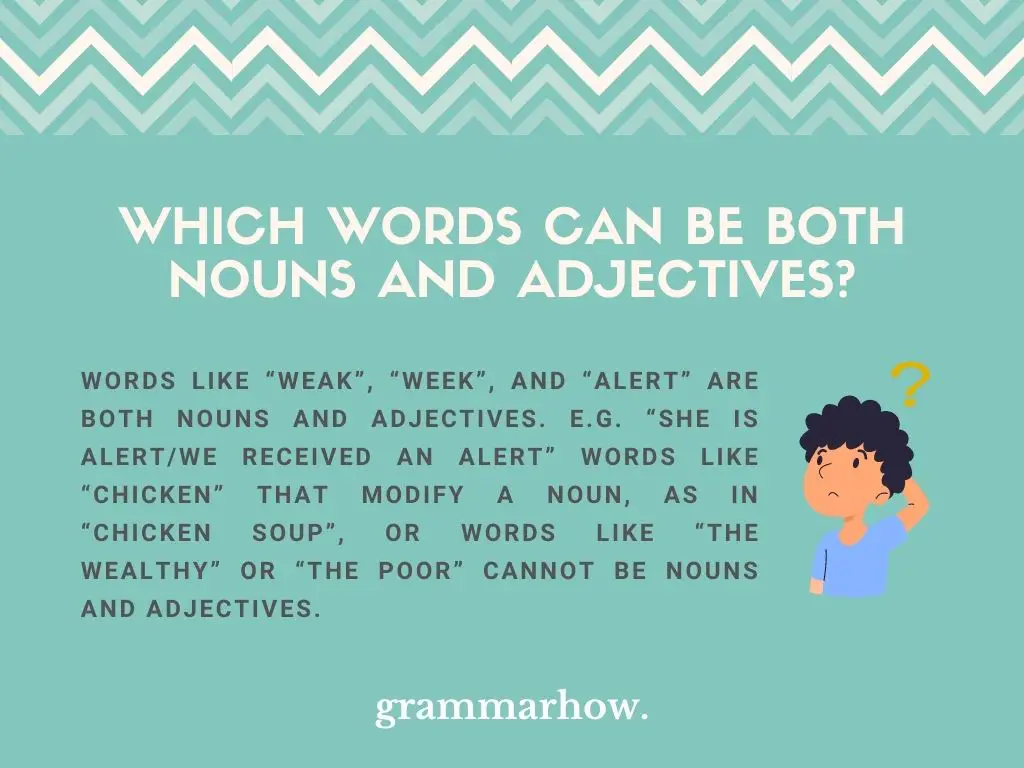Some words in English can be both adjectives and nouns. This page contains a list of 99 adjectives that are also nouns and explains how it is possible for them to be both nouns and adjectives.
Which Words Can Be Both Nouns and Adjectives?
Words like “weak”, “week”, and “alert” are both nouns and adjectives. E.g. “She is alert/We received an alert” Words like “chicken” that modify a noun, as in “chicken soup”, or words like “the wealthy” or “the poor” cannot be nouns and adjectives.

The types of words that CANNOT be nouns and adjectives are “attributive nouns” and “nominal adjectives.”
For example:
- Chicken stew – Attributive noun
- Plastic gloves – Attributive noun
- The poor – Nominal adjective
- The wealthy – Nominal adjective
The types of words that can be adjectives and nouns are “homonyms” and “heteronyms”, which are words that are written alike but have different sounds and meanings, or words that are written the same but have different pronunciations and meanings.
For example:
- Content – Adj – To be satisfied
- Content – Noun – What is contained within something, such as a book.
- Tart – Adj – Sour
- Tart – Noun – A type of flan or pie, usually sweet.
Here is a printable PDF list of common words that can be nouns and adjectives:
- Abstract
- Alert
- Antique
- Average
- Back
- Base
- Best
- Better
- Brief
- Chief
- Classic
- Clear
- Close
- Cold
- Compact
- Complex
- Content
- Cool
- Cooler
- Dear
- Deep
- Down
- Evil
- Expert
- Fair
- Fake
- Fancy
- Fast
- Fat
- Female
- Few
- Fine
- Firm
- First
- Flat
- Fleet
- Good
- Grave
- Green
- Gross
- Half
- High
- Hollow
- Hurt
- Ideal
- Ill
- Intent
- Invalid
- Joint
- Juvenile
- Key
- Kind
- Last
- Left
- Light
- Lighter
- Limp
- Liquid
- Major
- Male
- Mean
- Minute
- Novel
- Number
- Orange
- Oval
- Phony
- Present
- Prime
- Prize
- Rank
- Rash
- Rear
- Right
- Round
- Safe
- Sage
- Second
- Set
- Sharp
- Sore
- Sound
- Spare
- Split
- Square
- Stable
- Static
- Still
- Straight
- Stray
- Suspect
- Tart
- Tender
- Terminal
- Token
- Total
- Trial
- Upset
- Well
How Can Words Be Both Nouns and Adjectives?
The types of words that can be both nouns and adjectives are “homonyms” and “heteronyms.”
“Homonyms” are words spelt and pronounced the same but that have different meanings. “Heteronyms”, on the other hand, are words that sound the same but are spelt differently.
Homonyms
- Straight – A stretch of water between two land masses.
- Straight – Something that doesn’t have any curves or bends.
- Rash – A type of skin infection.
- Rash – Someone who makes decisions without thinking.
Heteronyms
- Week – A period of seven days.
- Weak – Without strength.
- August – The eighth month of the year.
- august – Respected and impressive.
- Content – The information contained in a book/website/essay etc.
- Content – To be satisfied.
Example Sentences
Here are some examples of the types of words that can be both an adjective and a noun.
Of course, there are exceptions, but on the whole, the words operating as both nouns and adjectives are “homonyms” and “heteronyms.”
Here are some examples of the words from the above section in sentences:
- I can’t believe I survived the whole week at work.
- After running 5km, I felt so weak I thought I would pass out.
- His birthday is in the month of August.
- Their behavior was not in keeping with their august status.
- The content of the website was a little underwhelming, to say the least.
- She felt content after she had discussed her problems.
Can a Proper Noun Be an Adjective?
Some words can be “proper nouns” and adjectives, usually because a particular style is named after a specific person or era or when specifying the nationality of something.
These types of words are known as “proper adjectives.” Examples of “proper adjectives” include “Shakespearean”, after William Shakespeare, and “Orwellian”, after the author “, George Orwell.”
Other examples of “proper nouns” include nationalities or any words that relate to a person, religion, or time period, such as “Romanesque” or “Catholic.”
Here are some examples of “proper nouns” used as adjectives:
- The Catholic philosophy on the subject is a little outdated.
- He conducted his marriage with almost Orwellian surveillance.
- The Mexican culture is rich in history and heritage.
- I wanted a Georgian house, but in the end, I bought a Victorian one.

Martin holds a Master’s degree in Finance and International Business. He has six years of experience in professional communication with clients, executives, and colleagues. Furthermore, he has teaching experience from Aarhus University. Martin has been featured as an expert in communication and teaching on Forbes and Shopify. Read more about Martin here.
